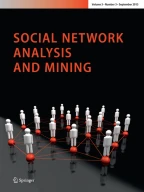Abstract
Given a newly posted question on a Question and Answer (Q&A) site, how long will it take until an answer is received? Does response time relate to factors about how the question asker composes the question? If so, what are those factors? With advances in social media and the Web, Q&A sites have become a major source of information for Internet users. Response time of a question is an important aspect in these sites as it is associated with the users’ satisfaction and engagement, and thus the lifespan of these online communities. In this paper, we study and estimate response time for questions in StackOverflow, a popular online Q&A forum where software developers post and answer questions related to programming. We analyze a long list of factors in the data and identify those that have clear relation with response time. Our key finding is that tag-related factors, such as their “popularity” (how often the tag is used) and the num ber of their “subscribers” (how many users can answer questions containing the tag), provide much stronger evidence than factors not related to tags. Finally, we learn models using the identified evidential features for predicting the response time of questions, which also demonstrate the significance of tags chosen by the question asker.
Similar content being viewed by others
References
Anderson A, Huttenlocher DP, Kleinberg JM, Leskovec J (2012) Discovering value from community activity on focused question answering sites: a case study of stack overflow. In: KDD, pp 850–858
Arguello J, Butler BS, Joyce E, Kraut R, Ling KS, Wang X (2006) Talk to me: foundations for successful individual-group interactions in online communities. In: CHI, pp 959–968
Asaduzzaman M, Mashiyat A, Roy C, Schneider K (2013) Answering questions about unanswered questions of stack overflow. In: 10th working conference on mining software repositories. Mining Challenge
Avrahami D, Hudson SE (2006) Responsiveness in instant messaging: predictive models supporting inter-personal communication. In: CHI, ACM, pp 731–740
Chawla NV (2010) Data mining for imbalanced datasets: an overview. In: Maimon O, Rokach L (eds) Data mining and knowledge discovery handbook. Springer, New York, pp. 875–886
Dror G, Pelleg D, Rokhlenko O, Szpektor I (2012) Churn prediction in new users of yahoo! answers. In: WWW, pp 829–834
Harper FM, Raban DR, Rafaeli S, Konstan JA (2008) Predictors of answer quality in online Q&A sites. In: CHI, ACM, pp 865–874
Joyce E, Kraut RE (2006) Predicting continued participation in newsgroups. J Comput Mediat Commun 11(3):723–747
Lampe C, Johnston EW (2005) Follow the (slash) dot: effects of feedback on new members in an online community. In: GROUP, pp 11–20
Mahmud J, Chen J, Nichols J (2013) When will you answer this? estimating response time in twitter. In: ICWSM. The AAAI Press
Morris MR, Teevan J, Panovich K (2010) What do people ask their social networks, and why?: a survey study of status message Q&A behavior. In: SIGCHI
Movshovitz-Attias D, Movshovitz-Attias Y, Steenkiste P, Faloutsos C (2013) Analysis of the reputation system and user contributions on a question answering website: Stackoverflow. In: ASONAM, pp 886–893
Neville PG (1999) Decision trees for predictive modeling. SAS Institute Inc.
Newman MEJ (2005) Power laws, pareto distributions and zipf’s law. Contemp Phys 46(5):323–351
Rechavi A, Rafaeli S (2011) Not all is gold that glitters: response time & satisfaction rates in Yahoo! answers. In: SocialCom/PASSAT, IEEE, pp 904–909
Sun Y, Han J, Aggarwal CC, Chawla NV (2012) When will it happen?: relationship prediction in heterogeneous information networks. In: WSDM, ACM, pp 663–672
Wang G, Gill K, Mohanlal M, Zheng H, Zhao BY (2013) Wisdom in the social crowd: an analysis of Quora. In: WWW
Yang J, Wei X, Ackerman MS, Adamic LA (2010) Activity lifespan: an analysis of user survival patterns in online knowledge sharing communities. In: ICWSM
Yao Y, Tong H, Xie T, Akoglu L, Xu F, Lu J (2014) Joint voting prediction for questions and answers in cqa. In: ASONAM, IEEE/ACM international conference, pp 340–343
Yao Y, Tong H, Xu F, Lu J (2014) Predicting long-term impact of cqa posts: a comprehensive viewpoint. In: KDD, ACM, New York, NY, USA, pp 1496–1505
Acknowledgments
This material is based upon work supported by the Army Research Office Young Investigator Program under Contract No. W911NF-14-1-0029, National Science Foundation CAREER 1452425 and IIS 1408287, an R&D Grant from Northrop Grumman Aerospace Systems, and Stony Brook University Office of Vice President for Research. Any findings and conclusions expressed in this material are those of the author(s) and should not be interpreted as representing the official policies or views, either expressed or implied, of the funding parties.
Author information
Authors and Affiliations
Corresponding author
Rights and permissions
About this article
Cite this article
Bhat, V., Gokhale, A., Jadhav, R. et al. Effects of tag usage on question response time. Soc. Netw. Anal. Min. 5, 24 (2015). https://doi.org/10.1007/s13278-015-0263-3
Received:
Revised:
Accepted:
Published:
DOI: https://doi.org/10.1007/s13278-015-0263-3
